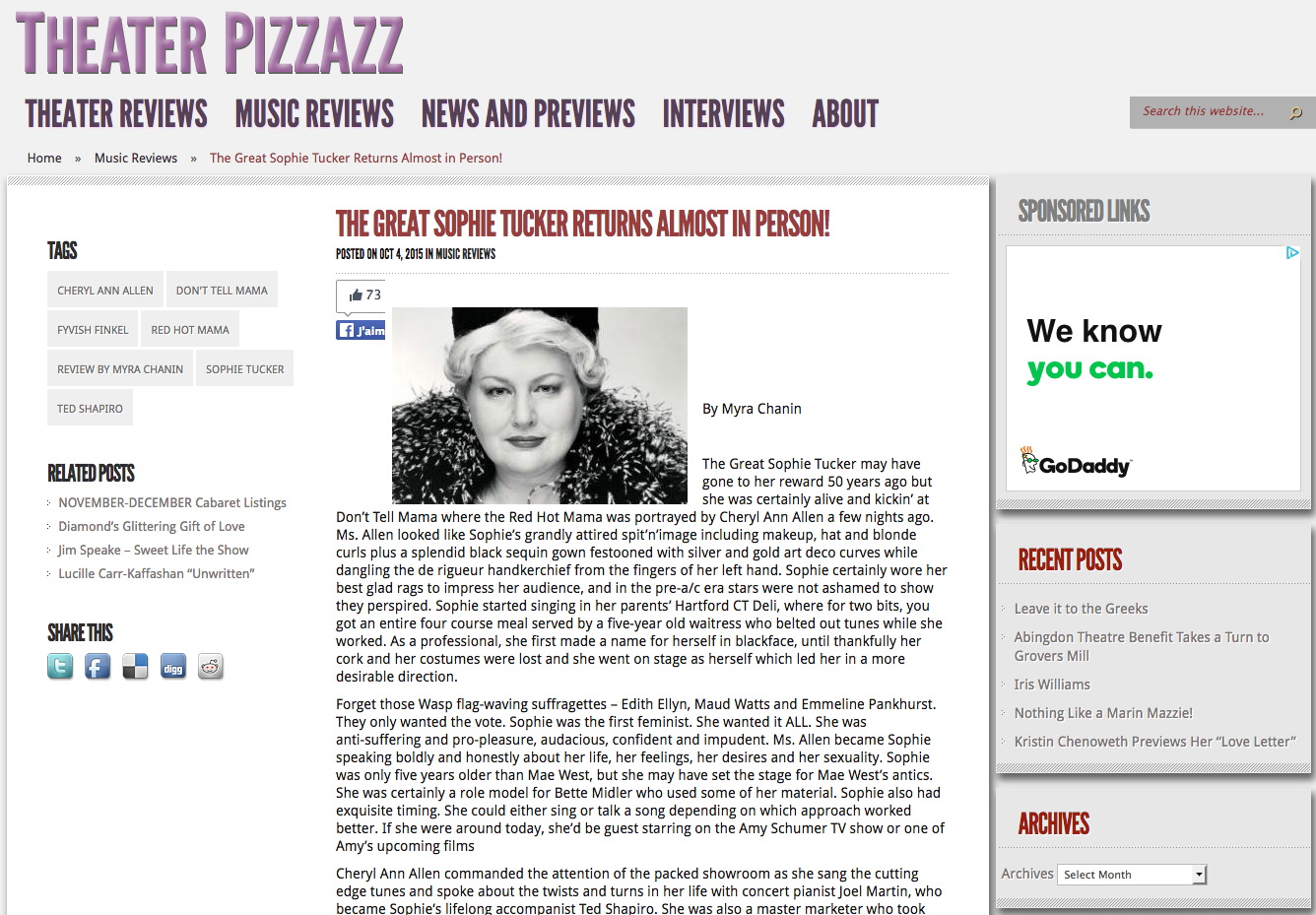
“Sophie Tucker in Person” Is a Heady Cocktail
Reviewed by Eric Edelman
Imagine a heady, old-fashioned cocktail of Ethel Merman with a twist of Mae West. That’s Cheryl Ann Allen, who performed this past Mother’s Day in the one-woman show “Sophie Tucker in Person.”
Written and directed by Ian Finkel, son of the late cherished Yiddish actor, Fyvush Finkel, “Sophie Tucker in Person” sets a high standard for musical theater especially in these days of the Internet and Smart Phones, when few get to enjoy in person the glory and beauty of vocal performance.
Too often, musicals and plays on Broadway and even Off-Broadway tend to be heavy on spectacle, light on plot and character, and burdensome on the pocketbook. May 12th at the Triad Theater in Manhattan, “Sophie Tucker in Person” stood out as an incredible value: a rare, high-quality musical soirée at a price that didn’t force patrons to hock their engagement rings.
Musical Necklace
The plot of this one-woman show is structured as a musical necklace. Tucker’s most famous songs are gems joined together by the cord of her life story. Beginning and ending with her most popular number, “Some of These Days,” and progressing through classics, including “Last of the Red-Hot Mamas,” “There’ll Be Some Changes Made,” and “After You’ve Gone,” Ms. Allen as Sophie Tucker tells of the key events and people in her life, keeping to a rough chronological order.
The thread of the narrative, however, is not just a rope with song-beads strung haphazardly. Mr. Finkel has arranged the show such that situations in Tucker’s life lead purposefully into each number. “I’m Living Alone and Liking It” relates to her difficulties with husbands and male friends, while “Mr. Siegel” humorously bemoans the problems of dealing with a man who won’t commit to his fiancée. “I Never Can Think of the Words” refers to Tucker’s worsening memory retrieval as she aged and, in this number, Ms. Allen shows how even forgotten lyrics mid-song would not force Tucker to interrupt a performance. She faces this deficit light-heartedly, in a presentation tinged with a bit of romance and sadness but completely free of self-pity.
The poignant, nostalgic classic, “My Yiddishe Mama” recalls Tucker’s conflicted relationship with her own mother, summoning up both love and struggle. “Life Begins at Forty” is a paean to gifts of aging, replete with simplified desires and lower, bordering on non-existent, expectations. “Follow a Star” shows off Tucker’s indefatigable ambition and drive to excel.
A Reincarnation
Ms. Allen’s fine, strong voice, excellent attack, and precise pitch and tone project more than just an impression of Sophie Tucker alive. As any perusal of Tucker on YouTube will confirm, Ms. Allen manages a reincarnation. The resemblance between her voice in person and that of Tucker on recordings is startling. Ms. Allen even manages Tucker’s quivery, aging vibrato, an element that doesn’t undercut her powerful performance, but actually augments it. Speaking as Tucker, Ms. Allen gives a slight added “-ah” to the end of her phrases, a cue that perfectly mimics Tucker’s spoken delivery.
The persona is enhanced by Ms. Allen’s superb make-up and costumes, all of which help her mirror Tucker’s characteristic public appearances.
Mr. Finkel, who served also as lyricist and musical arranger, deserves the lion’s share of credit for creating the show’s ingenious plot structure which truly brought Tucker to life for 21st-century audiences. Portraying Ted Shapiro, Tucker’s accompanist and confidant whose banter with her became part of her act, Dan Rosengard performed a musical miracle, managing to range from an unobtrusive, supportive pianist to, when necessary, the equivalent of an entire theatre-pit orchestra.
Complex and Conflicted
For Jewish audiences, Sophie Tucker was always a complex and conflicted personality. A versatile entertainer of strength and great joy, who never minimized her Jewish roots, she was a woman of immense kindness. An early advocate for civil rights, she had good friends in the African-American entertainment community at a time when treating black performers as equals was far from the norm.
Born Sofya Kalish in the Ukraine in 1886, she grew up in Boston and Hartford, singing in her parents’ restaurant for tips. When she was 17, she eloped with Louis Tuck, a beer cart driver, and had her son, Albert, with him. The couple separated soon after the baby’s birth, and Tucker left him with her family so that she could pursue her career in New York. She went on to have two more failed marriages, and her relationship with Burt, her only child, was estranged.
In 1907, she made her first theatrical appearance, singing at an amateur night in a vaudeville establishment. At her producers’ insistence, she was in blackface. A year later, she told them her luggage, including her makeup kit with the burnt cork, was lost. They allowed her to go on stage without the blackface.
That night, she told the audience, “You all can see I’m a white girl. Well, I’ll tell you something more: I’m not Southern. I’m a Jewish girl and I just learned this Southern accent doing a blackface act for two years. And now, Mr. Leader, please play my song.”
An Art Form
When she became a headliner with the Ziegfeld Follies, it was as an extremely overweight yet self-mocking and self-accepting performer who managed to project a voluptuous persona peppered with sharp but never vulgar sexual innuendo. Too large both literally and figuratively for the movies, she triumphed on the live musical stage.
Sophie Tucker was an American performing artist who managed to create from the tragi-comic mixed bag of her own life story an entirely unique style of performance that she turned into an art form.
A good way to get to know Tucker and her music is to see the re-creation by Ms. Allen and company in “Sophie Tucker in Person.”





